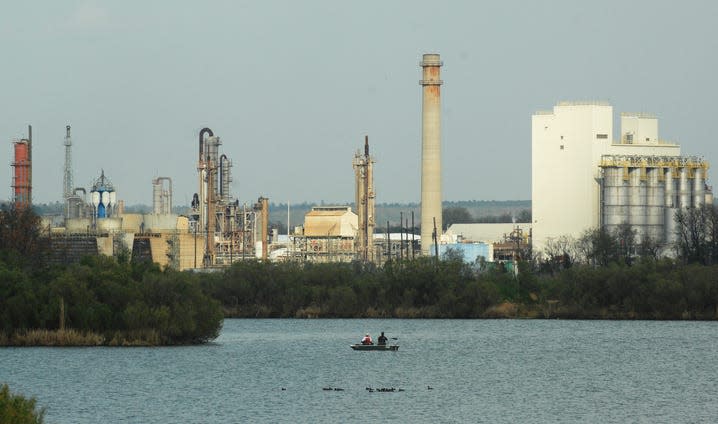The EPA is increasing air quality standards. Will it help Augusta's air?

Augusta has the worst air quality in the state of Georgia for fine particle pollution according to the U.S. Environmental Protection Agency (EPA), and new regulations from the agency may force the city to start anew a cleanup effort.
The EPA has published a draft of a new rule proposing that the current standard for air pollution in the U.S., which hasn't been updated in about a decade, become more strict because of the pollution's impact on human health. Specifically, the agency is cracking down on PM 2.5 — the tiniest pieces of air pollution — that have the worst impact on public health.
Sources: Augusta manufacturer largest source of CO2 in Georgia, emissions tracker reports
History of pollution: Lawsuit claims Augusta medical equipment sterilizer plant's emissions add to cancer risk
What is PM 2.5?
PM 2.5 is a type of fine particle humans can inhale. It was given its name because the particles are 2.5 micrometers or smaller. The average human hair is about 70 micrometers in diameter, roughly 30 times larger than the largest PM 2.5 particle.
Right now, the nation's upper limit for PM 2.5 pollution is 12 micrograms per cubic meter, and the EPA is proposing dropping that to a range from 9 to 10 micrograms per cubic meter.
PM 2.5 can come directly from sources such as construction sites, unpaved roads, fields, smokestacks or fires. It can also be the result of complex chemical reactions in the atmosphere such as sulfur dioxide and nitrogen oxides, which are pollutants emitted from power plants, industries and automobiles.
If Augusta is out of compliance with new air quality standards, it could make it harder for industries to get environmental permits and cause the city to reassess where it can cut down on emissions.
Before approving the new measures, EPA is taking comments, including from the Georgia Environmental Protection Division. Should it pass, EPD will begin work with its Air Division on creating a plan to get Georgia on track with the new emissions standards.

Augusta on the cusp
Out of all the air quality monitoring stations in Georgia, Augusta annually tops the list for air pollution.
Based on EPA air monitoring data from 2019 to 2021, Georgia's garden city is projected to be the only city in the state that would not meet the new air quality standards, even at the upper limit of 10 micrograms per cubic meter.
This isn't Augusta's first flirtation with air quality noncompliance: The last time the EPA revised standards over a decade ago, Augusta was in the same situation. And statewide, Georgia only reached complete attainment of EPA clean air standards last October, making the state's period of reaching air quality goals potentially short-lived.
If the EPA opts for a stricter number closer to 9 micrograms per cubic meter, other metro areas such as Atlanta and Columbus could also fall into noncompliance.
For residents, Augusta's air quality has been perfectly legal over the years even though it has been potentially harmful to their health. According to Dr. Rabih Bechara, a pulmonologist and professor of medicine at the Medical College of Georgia at Augusta University, the EPA's new regulation would realistically improve citizens' health in the Augusta area.
"As we all suspect, it's pretty intuitive," Bechara said. "Having clean air is definitely an important thing not only for us as individuals but also for our children."
Fine particulate matter is so small it embeds into the lung tissue itself, and it increases the risk of early asthma in infants, and even cancers such as skin cancers, lung cancers and head and neck cancers.
Overall, the EPA estimates that this regulation change would prevent up to 4,200 premature deaths per year, up to 270,000 lost workdays per year and result in as much as $43 billion in net health benefits in 2032.
"Data has shown that (people of color) tend to be in areas which are closer to these industries and tend to get more severe consequences from that," Bechara said.
Augusta officials did not immediately offer comment on the EPA proposal.
Where the rubber meets the road
Crunching the numbers for projected emissions in 2032, almost a whole decade away, the EPA estimates Augusta-Richmond County — and every other county in Georgia aside from Fulton — are projected to meet these standards in the future.
There are several ways the Augusta area can get from point A to B with clean air.
Isabella Ariza is an associate attorney with the Sierra Club, an environmental advocacy and lobbying nonprofit. She works with the organization's environmental law program, focusing on issues related to fighting coal emissions. Recently, she finished up commenting and engaging in the Georgia Power rate case, the hearings which determine how Georgia Power takes in revenue and operates the state's utilities for the coming years.
Ariza said one of her organization's goals headed into the rate case was pushing Georgia Power to transition away from coal plants faster than the utility company has planned. Georgia Power plans to phase out all of its coal plants except for Plant Bowen in Bartow County by 2028.
Marisa Mecke is an environmental journalist. She can be reached at 912-328-4411 or at mmecke@gannett.com.
This article originally appeared on Augusta Chronicle: EPA draft rule on particulate matter air pollution will impact Augusta

